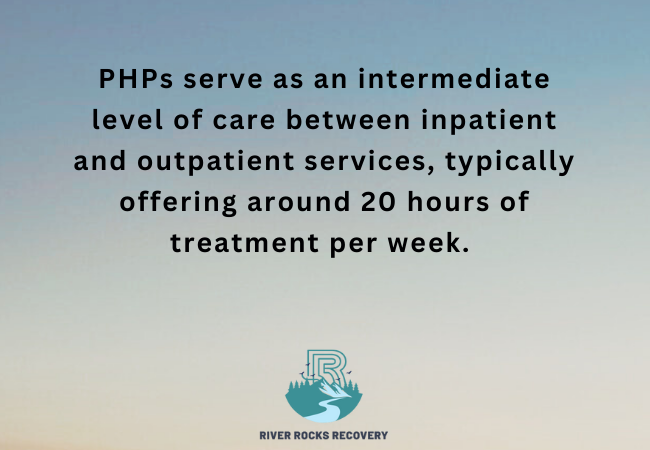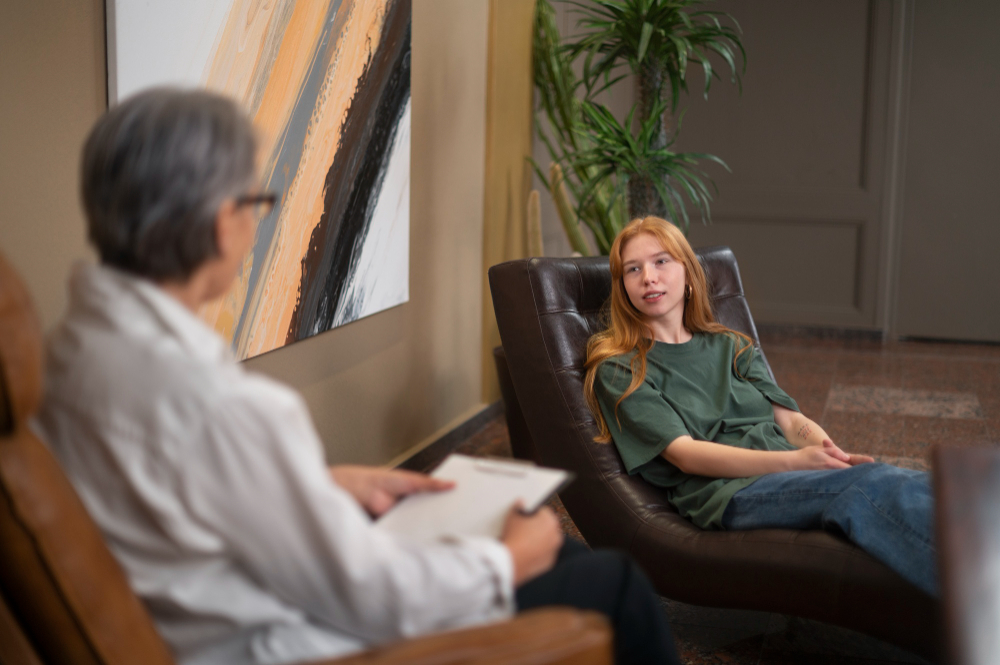Recovering from addiction is not just about quitting substances—it’s about rebuilding a life rooted in health, structure, and purpose. One of the most powerful tools in achieving this transformation is daily routine. For individuals who need intensive support but still want the flexibility to live at home or in sober housing, a Partial Hospitalization Program (PHP) is the ideal middle ground.
At River Rocks Recovery, our Partial Hospitalization Program in Ohio provides a structured and supportive environment for those recovering from opioid, meth, alcohol, or other substance use disorders. PHP offers the same clinical intensity as inpatient rehab—but without overnight stays. It’s a key component of our Addiction Treatment Program Ohio and a proven step in achieving long-term sobriety.
Let’s take an in-depth look at what a typical day in our PHP looks like and how the structure and therapeutic schedule support each individual’s recovery journey.
What Is a Partial Hospitalization Program (PHP)?
A Partial Hospitalization Program (PHP) is a comprehensive day treatment model that combines intensive therapy, medical oversight, and peer support in a non-residential format. Clients attend treatment for 5–6 hours per day, typically 5 days a week, and return home or to a sober living facility at night.
PHP is ideal for people who:
- Have completed detox or residential treatment
- Are medically stable but need daily clinical support
- Have a safe and supportive living environment
- Are transitioning from inpatient rehab or preparing for outpatient treatment
- Need structure and accountability to maintain early sobriety
What to Expect Each Day in PHP at River Rocks Recovery
Here’s a breakdown of a typical day in our Partial Hospitalization Program in Ohio:
8:30 AM – Daily Check-In & Health Assessment
Each day begins with a group check-in and brief wellness evaluation by clinical staff. We assess:
- Physical symptoms (e.g., cravings, withdrawal)
- Emotional state and mood
- Medication adherence and needs
- Progress toward short-term goals
9:00 AM – Core Group Therapy Session
Group therapy provides a safe, structured space to process challenges and build recovery skills. Sessions are led by licensed therapists and may include:
- Cognitive Behavioral Therapy (CBT) for negative thinking patterns
- Dialectical Behavior Therapy (DBT) for emotional regulation
- Relapse prevention planning
- Trauma-informed therapy for those with underlying trauma histories
10:30 AM – Psychoeducational Workshop
These classes are designed to provide clients with a deeper understanding of:
- The neuroscience of addiction
- Coping with triggers and cravings
- Healthy communication and boundaries
- Nutrition, sleep, and physical self-care in recovery
- The role of mindfulness and stress management
12:00 PM – Lunch & Community Time
Clients enjoy a catered, nutritious lunch and have time to relax or engage with peers. This period helps foster connection and informal support, which are critical for healing.
1:00 PM – Individual Therapy or MAT Check-In
Each client meets regularly with their personal therapist to work through:
- Personal trauma
- Self-esteem and identity issues
- Family dynamics
- Co-occurring mental health disorders
Clients on Medication-Assisted Treatment (MAT) for Opiate Rehab Treatment in Ohio or Meth Rehab Treatment in Ohio will also meet with medical staff for medication management and psychiatric support.
2:00 PM – Family or Specialty Therapy
Recovery doesn’t happen in a vacuum. We incorporate family therapy to:
- Heal strained relationships
- Educate loved ones about addiction and relapse
- Establish healthy boundaries
- Support long-term recovery at home
Specialty groups may also include:
- Art therapy
- Music therapy
- Meditation and yoga
- Vocational readiness and life skills
3:30 PM – Day Wrap-Up & Intentions for Tomorrow
Each day ends with a final group to:
- Review the day’s insights
- Set personal goals for the evening
- Reinforce coping strategies
- Prepare for tomorrow’s focus
How PHP Differs from Other Levels of Care
PHP is more intensive than outpatient or intensive outpatient treatment, but less restrictive than inpatient rehab. Here’s a comparison:
| Treatment Level | Living Arrangement | Treatment Intensity | Best For |
|---|---|---|---|
| Inpatient Rehab | 24/7 residential | High | Severe or high-risk cases needing detox, stabilization |
| PHP | Daytime treatment, nights offsite | Medium-High | Clients who are medically stable but need daily structure |
| IOP | 3–5 sessions/week | Moderate | Transitioning from PHP or managing work/school |
| OP | 1–2 sessions/week | Low | Maintenance, relapse prevention |
How Structure and Routine Support Long-Term Recovery
One of the most overlooked but essential benefits of PHP is how it restores routine and structure to daily life—both of which are disrupted during active addiction. Here’s how:
1. Restores Healthy Habits
Substance use often causes people to neglect basic needs like sleep, nutrition, and hygiene. PHP helps clients re-establish:
- Consistent sleep-wake cycles
- Regular meals and hydration
- Morning and evening routines
2. Builds Accountability and Responsibility
Daily check-ins and consistent therapy sessions teach clients to show up for themselves and others, even when it’s hard—rebuilding trust in themselves and their recovery process.
3. Replaces Chaos with Purpose
Addiction thrives in disorganization. PHP introduces:
- Goal-setting
- Skill-building
- Purpose-driven activity
These foster a sense of momentum, progress, and achievement.
4. Bridges Real Life and Recovery
Unlike inpatient rehab, PHP allows clients to practice recovery skills in real-world situations every evening. This real-time exposure helps solidify lessons learned in therapy and prepares them for greater independence.

Integrated Dual Diagnosis Care in PHP
At River Rocks Recovery, we understand that addiction is often accompanied by mental health disorders. Our PHP offers:
- Psychiatric evaluations
- Medication management
- Therapy for PTSD, depression, anxiety, and bipolar disorder
- Holistic wellness practices to support mental well-being
Who Is a Good Fit for PHP?
PHP may be right for you if:
- You’ve recently completed detox or inpatient care
- You require daily support for substance use and/or mental health
- You want structured treatment but live in a safe home or sober housing
- You’re using MAT for opioid or alcohol use disorder
- You’re stepping down from inpatient care or stepping up from outpatient care
How River Rocks Recovery Supports Your Full Continuum of Care
Our Addiction Treatment Center in Ohio offers comprehensive services, including:
- Medical Detox
- Inpatient Residential Treatment
- Partial Hospitalization Program in Ohio
- Intensive Outpatient Program in Ohio
- Outpatient Program in Ohio
- Aftercare and alumni support for sustained sobriety
We guide you through every step with compassion, clinical excellence, and personalized care.
Conclusion
The daily routine of a Partial Hospitalization Program is designed to do more than fill your day—it’s built to change your life. With clinical care, behavioral therapy, accountability, and real-world practice, PHP gives you the structure, tools, and momentum needed to stay on the path to recovery.
Whether you’re seeking help for opioid addiction, meth use, or alcohol recovery, River Rocks Recovery provides the framework you need to heal and thrive. Call 888.905.6281 today to start your journey with our expert team to learn more about our PHP and full-spectrum addiction recovery programs in Ohio.
Build the life you deserve—one structured, supported day at a time.
FAQ – Partial Hospitalization Program (PHP)
What is a Partial Hospitalization Program (PHP)?
A Partial Hospitalization Program is a structured, full-day addiction treatment program that provides clinical therapy, medical oversight, and psychiatric support while allowing clients to return home or to sober living at night.
How long do clients stay in PHP each day?
Clients typically attend PHP 5 to 6 hours a day, five days a week. Each day includes individual therapy, group sessions, wellness education, relapse prevention, and skill-building workshops.
What types of therapy are included in PHP?
At River Rocks Recovery, PHP includes:
-
Individual therapy
-
Group therapy
-
Family counseling
-
CBT, DBT, and trauma-informed care
-
Medication-Assisted Treatment (MAT) support
-
Psychoeducation and life skills training
Who should attend a PHP?
PHP is ideal for individuals who:
-
Have completed detox or inpatient rehab
-
Need daily support for substance use and/or mental health
-
Are transitioning from inpatient to outpatient care
-
Have a safe, supportive home or sober living environment
How is PHP different from inpatient rehab?
-
Inpatient rehab requires clients to live at the facility 24/7.
-
PHP offers the same clinical intensity during the day but allows clients to live at home or in sober housing in the evenings.
Is PHP covered by insurance?
Yes, most insurance plans cover Partial Hospitalization Programs. River Rocks Recovery works with major providers and offers free insurance verification to determine your benefits. Call 888.905.6281 to learn more.
Can I work or go to school while in PHP?
PHP requires a weekday daytime commitment, so full-time work or school may not be possible. However, PHP is a great fit for those preparing to re-enter work or education as they transition into Intensive Outpatient Programs (IOP).




























